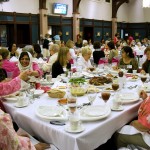By Kafah Bachari Manna
 Growing up in the 1980s as an Iranian in America often overshadowed my experience of growing up as a Muslim in America. Back then, being a Muslim was not quite as interesting or dangerous as being an Iranian on U.S. soil. Indeed, I got a kick out of telling fellow Americans that their movies and fashions were a big hit in Iran and that all this hullaballoo about “Down with the Great Satan” did not resonate with the average Ali Reza on the street in Tehran.
Growing up in the 1980s as an Iranian in America often overshadowed my experience of growing up as a Muslim in America. Back then, being a Muslim was not quite as interesting or dangerous as being an Iranian on U.S. soil. Indeed, I got a kick out of telling fellow Americans that their movies and fashions were a big hit in Iran and that all this hullaballoo about “Down with the Great Satan” did not resonate with the average Ali Reza on the street in Tehran.
After September 11th, more often people questioned me about my faith than about my national or ethnic origins; although occasionally these elements were merged and confused (e.g. Iranian = Muslim or Iranian = Arab = Muslim). And the narrative people approached me with, the ideas that informed their questions, often went against everything I knew and understood about how my faith shaped my view of the world and my place in it. It became routine to get asked whether I had been subjected to female genital mutilation, how I managed to marry a man out of love versus by arrangement, or whether I had to fight my family (as enforcers of my supposed faith) to get an education.
I did not always know how to begin to answer these questions and to address what was at the heart of them: a basic misunderstanding of Islam. Fringe extremist groups, purporting to be Islamic, created this narrative; and poorly informed and fearful non-Muslims, looking for a way to categorize and understand a group of people presented to them as the “other” in a post-9/11 framework, embraced it. Eventually, I learned to talk through the misconceptions and offer my experience as part of the broader experiences of the women in my family and of my generation (as opposed to offering my experience as a fluke or exception to the narrative of Islam as a faith inherently oppressive of women). Despite this, however, I never felt that my isolated encounters were enough. I believed that this narrative of Islam as repressive of women also constrained other women who felt as I did, but who did not quite know how to attack it in a systematic and effective way.

 Follow
Follow